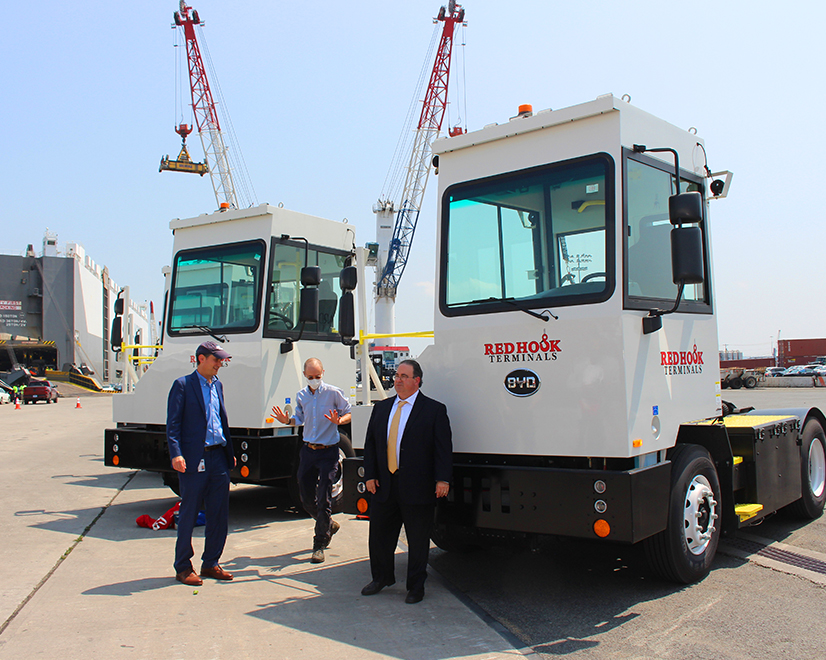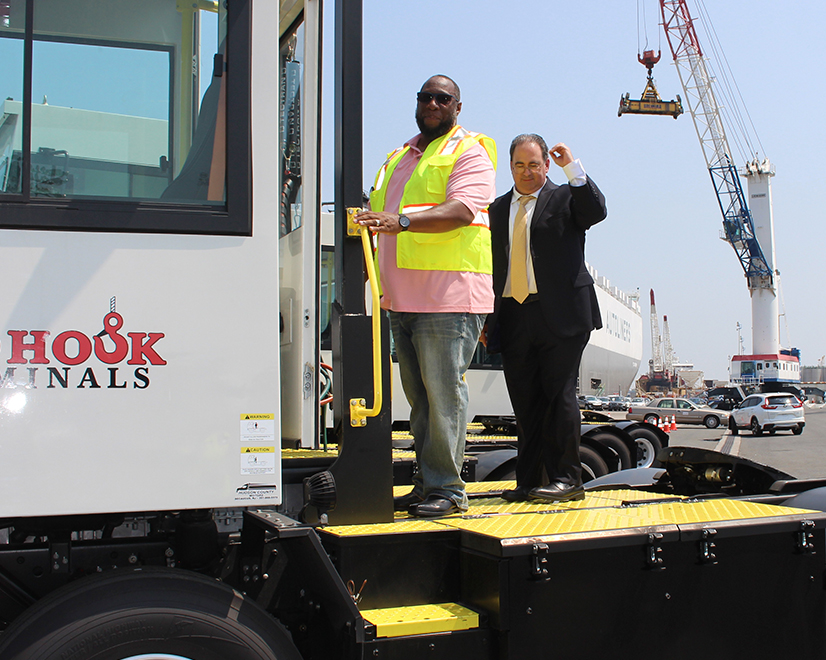
NEWARK, N.J. — The Port of New York and New Jersey unveiled a fleet of 10 electric yard tractors Wednesday in a clean energy initiative that officials portrayed as a major step forward for the port and New Jersey’s effort to cut carbon dioxide emissions.
The 10 trucks, made by Chinese manufacturer BYD, will replace diesel vehicles in use at the Port Newark terminal operated by Red Hook Container Terminals. The fleet of BYD Model 8Y vehicles is by far the largest advance in EV trucks at the port, where officials say only a handful of electric trucks are in use.
Speaking at an event in Newark to show off the trucks, Mike Stamatis, CEO of Red Hook Container Terminals, also pledged that the small terminal would reach the goal of 100% clean energy by 2025. That would require the replacement of six diesel reach stackers, which are used to put containers on trucks and electrification of two diesel mobile cranes, he said.
Stamatis said that he hoped the introduction of the trucks “will mark the beginning of a transition for the Port of New York and New Jersey, the industry around the country.”
The terminal loads containers on and off barges that move cargo across the New York Harbor between the New Jersey terminal and the port’s Red Hook terminal in Brooklyn. The service can carry 400 containers in one move, eliminating separate truck trips and the resulting carbon dioxide emissions. The yard tractors will move containers around the terminal or within the port from other terminals.
While the containers handled by Red Hook amount to a relatively small number for a port that in June moved nearly 750,000 twenty-foot equivalent units (TEUs), state and port officials, as well as environmentalists, hailed the introduction of the trucks.
“In no way do we look at these 10 trucks, the BYD electric trucks, as the finish line,” said Sam Ruda, ports director for the Port Authority of New York and New Jersey. “It’s an early first step.”
“That first step is telling us something: that we’re really now beyond the ‘what if’ (stage) in terms of technology,” Ruda said.
“The technology is here; the technology is improving,” he said, adding that New Jersey “will be first movers.” The port and marine industry share the state’s goal of reducing carbon emissions, he said.
Incentivizing EV Truck Use
Transportation accounts for 42% of carbon emissions in New Jersey. Gov. Phil Murphy’s goal is for the state to reach zero carbon emissions by 2050. Emissions from heavy trucks are a big contributor, and the state’s energy master plan, released in 2019, assumes that 75% of medium-duty trucks and 50% of heavy-duty trucks will be electric by 2050.
Port and trucking officials say there are few EV trucks on the road in New Jersey. The first two yard tractors were put into service at Newark-based trucking company Best Transportation, where owner Tom Heimgartner said the electric yard tractors made by Kalmar Ottowa, have so far performed well.
“They pull well, and they are perfect for port operations,” he said of the trucks, which were purchased, in part, with a state grant.
While yard tractors work well for short container moves within the port, truckers say the electric trucks on the market that are suitable for delivering cargo over longer distances are too expensive and can’t go far enough without needing to recharge. The maximum range is at present about 250 miles. In addition, truckers say, there are too few recharging points around the state.
Murphy’s administration has launched several programs to encourage truckers, businesses and government agencies to use EV trucks. The governor in February outlined grants of nearly $20 million for the purchase of electric cargo equipment and medium- and heavy-duty trucks to reduce carbon and other emissions in or around ports. The funds included $5.9 million for a planned project in which port trucking company International Motor Freight would purchase 16 electric trucks made by Daimler Trucks North America and two yard tractors. (See: NJ Targets Ports for EV Incentives.)
The New Jersey Department of Environmental Protection (DEP) in April unveiled proposed rules that would require manufacturers to meet increasing sales targets for medium- and heavy-duty electric trucks in the state after 2025. And the New Jersey Board of Public Utilities (BPU) is considering proposals on how to encourage the creation of more EV chargers for heavy duty vehicles. (See: NJ Outlines Plan to Boost EV Truck Sales.)
Shawn LaTourette, commissioner of the state Department of Environmental Protection, said the DEP’s next step to encourage EV truck use will be rules requiring fleets to include a certain percentage of EV trucks if they replace vehicles. Proposed rules will be released later this year, said LaTourette, speaking at the event.
Protecting Communities
Emissions from port truck traffic have long been a contentious issue because the port’s four biggest terminals are near the cities of Newark and Elizabeth. Hundreds of trucks pass through them each day to reach the port.
Kim Gaddy, a Newark resident and New Jersey and national environmental justice director for Clean Water Action, said it is “so important” that Red Hook had committed to 100% electrification in the terminal. She urged other port terminals to “make the same commitment.”
The 10 Red Hook trucks, which cost about $350,000 each, were funded with a grant of about $2.5 million from the state’s Volkswagen settlement fund. Red Hook paid the rest, about a third of the cost, which is about what the company would have spent on a new diesel truck, Stamatis said.

The trucks will be used only to move containers around the port, so range is not an issue. The vehicles can operate continuously for 12 hours before recharging, which can be done in two hours with a fast charger, if the truck starts at 20% charge, Red Hook said.
Stamatis, who operates the smallest terminal in the port, said he embarked on the EV truck initiative in response to the damage wreaked by Superstorm Sandy in 2012. He expressed the hope that the other terminals would follow suit.
“Doing nothing is simply not an option when the technology exists and is improving every day,” he said.
Cortney Worrall, CEO of the Waterfront Alliance, which advocates for good public use of area coastlines, said “Red Hook Terminals’ investment set the standard for other industry investments.” She cited the report released this week by the UN’s Intergovernmental Panel on Climate Change that concluded the world is at “code red for humanity.” (See Too Late to Stop Climate Change, UN Report Says.)
“The message for all and especially the many stakeholders in the maritime and port industries, is that we have time to end fossil fuel-based emissions to prevent the worst-case scenarios,” she said. “But we must make those commitments now.”


